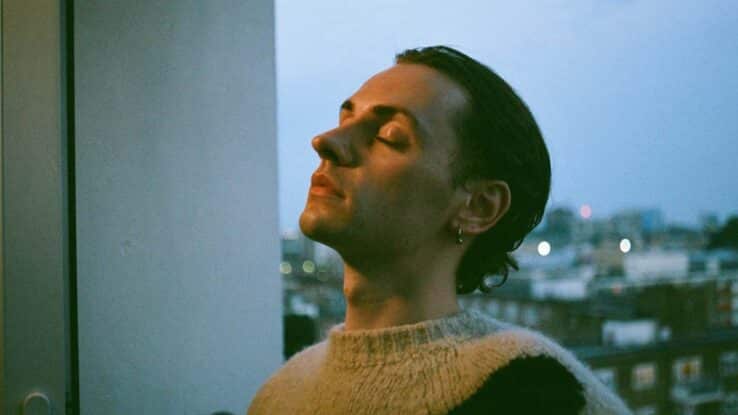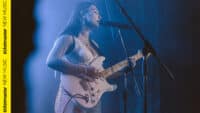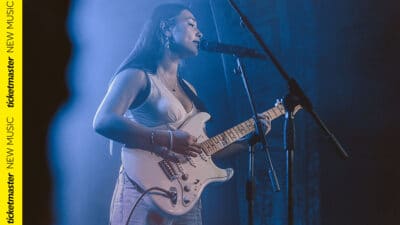Interview

Interview
Puma Blue: “Wherever there’s darkness, there’s always light. You just have to look for it”
Jacob Allen, aka Puma Blue, talks us through the making of the album that saved him
Read any review of the new Puma Blue album and you’ll struggle to work out exactly what it is. Holy Waters released at the start of September to critical acclaim, and a whole lot of confusion over which shelf of the record store it belonged on. Variously tagged trip hop, space rock, modern jazz, lo-fi R&B, bedroom pop and “experimental electronic-cum-ballad soundscapes”, Holy Waters provoked a lot of emotions from everyone who heard it – with good reason.
Inspired by grief, the album emerged from some of the toughest years of Jacob Allen’s life. Deeply private, often painful, it’s a haunted album full of unexpected hopefulness. Drawing comparisons to Radiohead, Portishead, Jeff Buckley, Ben Howard, Björk and everyone else who’s impossible to pigeonhole, Puma Blue sits comfortably on the fringes of modern indie.
Having spent the last few years writing for Loyle Carner, Mahalia and others, Allen followed up 2021’s In Praise Of Shadows with his most personal album yet. Also his proudest.
“I feel like I always have something to criticise about my music once it’s finished,” says Allen, speaking from his home studio in Los Angeles. “But this is the first time I feel like I’ve been able to kind of just sit back as a listener and enjoy it, which is so rare.”
With Holy Waters out now, and with Puma Blue set to start their UK tour from 25 September, we spoke to Jacob Allen about making the best, and most emotional, music of his career.
You mentioned the fact that you’re able to enjoy Holy Waters as a listener now – how long did it take to distance yourself from the nitty gritty of making it?
The thing is, I listen to a lot of music when I’m writing and when I’m preparing for a project, but once I’m deep in the thick of working on an album, I tend to not really listen to much else, because my head is just so full of my own thing. You’re listening to your own stuff constantly as you’re working, so sometimes it feels like it’s all you’ve heard. So, usually I’ll just want to leave it alone for a year or two. But this time I had a really emotional experience listening to the masters as soon as they were finished. By the time we started putting singles out I was genuinely excited by it again, which is really refreshing.
Where did this album begin for you? When did you start thinking about the direction this was going to take?
I guess for me, it was being in lockdown and realising that the thing I love most about this project is the band. It’s playing live, with the guys. So when it came to writing it felt really important to involve the band somehow. Usually, I write and produce everything alone. But this time I just felt like I needed to marry the live thing with the bedroom production thing. So that was really the seed that sparked the way this album feels and sounds: realising my music could be more special if I let other people in.
Was there any kind of reticence to that though? Letting other people in on the creative process?
It was scary. I don’t know that I’m much of a natural leader. I mean, I started off as a drummer, and I didn’t really expect to get this far with writing and singing and stuff. These guys are all my close friends too… So as I’m wanting to express my vision and kind of steer the ship, I also didn’t want anyone to think I wouldn’t be able to let go, you know? But I think, in fact, it was the opposite: every time I let go of creative control, every time I loosened my grip on steering wheel, it was more fun and more exciting. I preferred the results. I think there was a lesson there in learning to trust the process.
This is a deeply emotional album. And it deals with a lot of very difficult themes. Are you comfortable talking about where some of that came from?
I lost a couple of people during the pandemic. Neither of them to COVID, actually, but both during that time. Loss just kind of seemed to surround the album. Everyone in the band experienced a loss of some kind, in quite a significant life changing way. And then even since wrapping the album, I’ve experienced further loss. I wasn’t ever setting out to make an album about death, but I think just through trying to stick to sincerity that just ended up coming up, over and over again.
You know, there’s no real way of coping with grief. You kind of just have to face it head on. So I suppose this album was just about finding ways to process what I was feeling. And that came up in lots of ways, from ‘Epitaph’, which is really just a love song to my grandma, to songs like ‘Mirage’, which were more about the feeling you have when you think you see someone and then you remember that they’ve passed.
You’ve spoken about wanting this album to help you “make peace with death”. What does that peace look like for you?
To me, it’s not necessarily the same peace that comes from love or friendship, but it’s more of an acceptance, you know? I think when you start to see death as a natural part of life – long after we’re gone and long before we arrived – it starts to make you feel less pain. You feel the loss, but it’s less tragic somehow.
That’s maybe especially true in the last track, ‘Light Is Gone’. What did you want that song to leave people with?
I suppose that song felt two-sided for me. On one hand, it was kind of a cry for help… just a wailing of pain and fear. That kind of depression that can feel unbearable. The absence of light. But at the same time it’s also a glimmer of hope. When we deal with things like climate change, and far right politicians getting into power, it was this idea of a flicker of light still always being present. I wanted to leave people with a silver lining in the last line [“don’t let the light take you whole”], because, you know, it’s a pretty heavy album… What I’m really trying to say is, wherever there’s darkness, there’s always light. You just have to look for it. That’s what I feel like I’ve kind of gained from this whole process.
Talking of process, you’ve got such a unique way of mixing analogue and digital. What do you start with when you’re writing?
I used to start on guitar, just sitting on the floor and singing until something kind of just came together. But these days I tend to start in the box. I’ll sit down with a Logic session and just fool around with some drums or bass loops. Or maybe I’ll even record a layer of vocals and just see if I can write some music to it. It feels more like I’m just throwing things at the wall and seeing what sticks. If it starts evolving from a seed, that’s my favourite. If I end up with a song that doesn’t sound anything like the original, like if I’ve actually gone and muted the thing that sparked the idea, that’s what I’m looking for.
And then I’ll also be writing lyrics on my phone or in my journal. They’re more like poems at that point. I’m not thinking about them like lyrics. But I find it helpful because I’ve then already got pages of work that I could maybe might fit in, even if I end up picking the apart and changing them into something else. And then obviously this time I wrapped up all of these demos and brought them to the band, which then started a whole new chain reaction of the process.
Since you released In Praise Of Shadows, you’ve worked with a lot of other artists including Loyle Carner, Mahalia and Biig Piig. What did those collaborations bring back to your own music?
I can get bogged down in what it is I’m about. I focus far too much on the question of ‘what is Puma Blue?’ ‘What is it that I’m saying?’ ‘What are the sounds?’ And it gets really messy. When I’m in the producer seat, or when I’m writing for other people, what I’m bringing to those sessions is more of a kind of craftsmanship, you know? I can be really proud of what I’m working on, even though it doesn’t align with what I’m doing in my own work.
Take Lolye Carner. I’ve been playing with hip hop and really flexing those production muscles, just thoroughly enjoying working on music that’s for rap. Whatever I’m craving that doesn’t fit for him, might be something for Puma Blue.
Puma Blue doesn’t feel half as easy to put in a box. The whole idea of genre is starting to feel very redundant for a lot of new artists isn’t it? What’s your take, as someone whose music seems to be deliberately pushing against those boundaries?
I think it can be helpful conversationally, when you’re referring to something super broad. It’s a bit like talking about art history – you can just sum up a couple of hundred years by saying “the Romantic period”, you know? But beyond that, it’s not helpful at all. I feel like people have been playing around outside of the box for 80 plus years now. And you could argue much longer, if you consider classical music history. But I do feel like that’s especially true now. There’s something about the way the younger generation of musicians have been soaking up all this different stuff. They’re really not thinking about genres. And that’s exciting.
Is there a downside?
Absolutely. Just because you can, it doesn’t mean you should just throw everything in the pot. That’s not how to make a good dish. But people are more willing now to accept difference. If you want to play with form and introduce ideas that “shouldn’t go together”, then people are generally more open to it than ever I think. The album I’ve just done is not really soul music, and it’s not rock music. And it’s certainly not trip hop. But, hopefully it all kind of works. Hopefully, there’s a cohesiveness to it that I probably would have been more scared of 10 years ago.
Let’s talk about the live shows. Your music tends to feel very personal – what’s it like adapting that sound for a big space with a lot of people in it?
It depends on the song but usually it’s actually a lot easier. The music sort of branches out in this very fungal way… I’ll often kick myself because once we’ve played a song live, it often kind of blossoms and become much better. And I’m like, ‘why didn’t we record it like that?!’ Reverse magic happens. But then, sometimes it just doesn’t translate as well. Like, we had this song ‘Opiate’ on the last album, that’s so simple. It’s a three-chord song, and it just kind of goes round and round. For me, it sounds quite like a pop song. But for some reason, it was just so hard to play live. It never really felt like we played it well. The more progressive the track, the better it seems to work live. Which is very strange.
Have you got a favourite track to play live?
‘Want Me’. That’s always my favourite thing to play live with the band, because there’s so much space. And I think the best part of it is the improvising. I really encourage the boys to stick to the structure but to basically improvise around it. I love how no night ever really feels the same. Songs like that just kind of take a journey of their own. And I really can’t wait to do that with these new ones.
Get tickets for Puma Blue’s UK tour starting 25 September
Holy Waters is out now.









